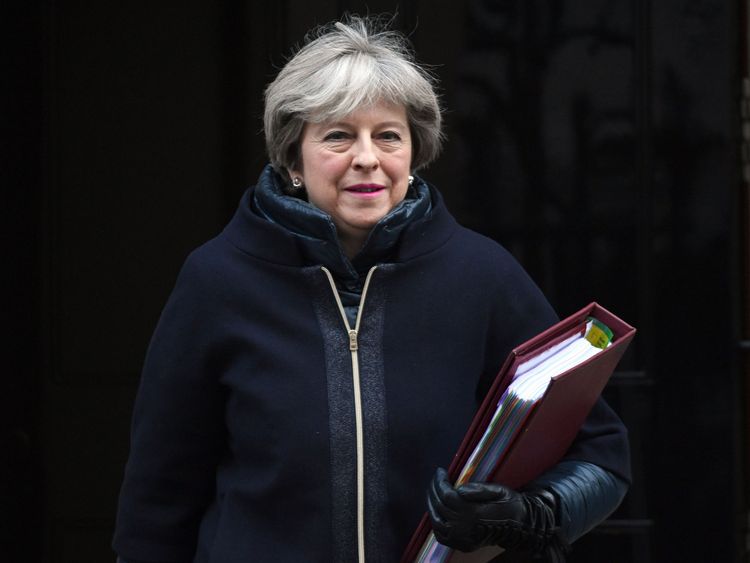British business leaders have lambasted Theresa May's cabinet for infighting over the UK's trade position, accusing ministers of putting ideology before jobs and investment.
Carolyn Fairbairn, director general of the Confederation of British Industry (CBI), will warn the Government that time is running out to make progress on Brexit and urge the Prime Minister to put replicating the customs union at the top of the trade agenda.
"This is a time – we believe – for revisiting some of the red lines," Ms Fairbairn told Sky News.
"If there is one thing business knows about, it's about negotiations and it's not the opening position that matters, it's the closing position that matters.
"This is a time, particularly as we know how urgent the decisions are, for revisiting.
"(With) the customs union, there have been doors that have been left open along the way.
"Let's take them because the business case, the common sense pragmatic case, for a customs union with the EU – negotiated effectively – is very strong.
"It's about jobs in the Midlands. It's about small manufacturers that need to trade in a friction-less way."
Ms Fairbairn will also tell the Government in the major speech on Monday that business needs a transition deal in place by March, with the outline of a final deal signed with the EU by October.
"We need to end this game of who-blinks-first and instead find a new spurt of urgency," Ms Fairburn will tell her audience at Warwick University.
"The UK team can't agree with itself, let alone with the EU. There's too much ideology, too little urgency."
The UK and EU have agreed to a two-year transition period when Britain leaves the EU in March 2019.
But the two sides have yet to agree the terms of that relationship or even discuss what a post-Brexit trade deal will look like.
Mrs May said last year that Britain was leaving the customs union but would seek to either "reach a completely new customs agreement to become an associate member of the customs union in some way, or remain a signatory to some elements of it".

But the issue deeply divides her cabinet.
Many Brexiteers are opposed to remaining in customs arrangements with the EU for fear it would hamper Britain's ability to strike free-trade agreements with other countries.
But Remain supporting MPs have left the option on the table, with Chancellor Philip Hammond insisting earlier this year that negotiations would "be guided by what delivers the greatest economic advantage to the UK."
Ms Fairbairn's intervention prompted a furious response from the pro-Leave camp.
One government source, who backed the Vote Leave campaign, told Sky News: "The CBI's position is at odds with most UK businesses and its defeatist position on the customs union is damaging to the UK's strategy for the forthcoming negotiations."
Richard Tice, businessman and co-chair of Leave Means Leave, also attacked the business lobby group for trying to "handcuff British business to unnecessary EU rules and regulations" despite the face that only about 10% of firms in the UK export goods to the EU."

He said: "We've always been crystal clear…that we need to leave the single market and the customs union.
"It's the CBI that is actually damaging our national interest by undermining the negotiating leverage of David Davis, the Prime Minister and our negotiating team. They should be ashamed of themselves."
Mrs May has yet to outline her own position on Britain's future trading relationship with the UK but will have a series of crunch meetings with her core Brexit cabinet this month to try to agree a negotiating position.
The Government is still pushing a "have our cake and eat it " strategy despite the EU's insistence that London cannot have a deal that gives Britain as many of the benefits of EU membership while shedding obligations.
For its part, the EU has indicated that Mrs May's Brexit red lines mean the only option available to the UK is a Canada-style free trade deal, which could limit the free trade of financial services between the UK and the EU.
Ms Fairbairn will say next week that a Canada-style deal would not be suitable for Britain because of those constraints, while a Norway-style single market deal is also a non-starter given that it would require continued free movement and payments into the EU.
More from Brexit
Instead the CBI wants the Prime Minister to carve out a trading relationship that is as closely aligned to current relationships as possible.
Ms Fairbairn told Sky News: "Let's start with what we have the EU has built up with the UK 40 years of shared standards and regulations that have been very good for business whatever we come up with let's start with that position and move forward."
[contf]
[contfnew]

Sky News
[contfnewc]
[contfnewc]







